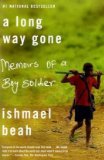Summary | Excerpt | Reading Guide | Reviews | Beyond the Book | Readalikes | Genres & Themes | Author Bio

Memoirs of a Boy Soldier
by Ishmael Beah
On the morning that we left for Mattru Jong, we loaded our backpacks with
notebooks of lyrics we were working on and stuffed our pockets with cassettes of
rap albums. In those days we wore baggy jeans, and underneath them we had soccer
shorts and sweatpants for dancing. Under our long-sleeved shirts we had
sleeveless undershirts, T-shirts, and soccer jerseys. We wore three pairs of
socks that we pulled down and folded to make our crapes* look puffy. When it got
too hot in the day, we took some of the clothes off and carried them on our
shoulders. They were fashionable, and we had no idea that this unusual way of
dressing was going to benefit us. Since we intended to return the next day, we
didn’t say goodbye or tell anyone where we were going. We didn’t know that we
were leaving home, never to return.
To save money, we decided to walk the sixteen miles to Mattru Jong. It was a
beautiful summer day, the sun wasn’t too hot, and the walk didn’t feel long
either, as we chatted about all kinds of things, mocked and chased each other.
We carried slingshots that we used to stone birds and chase the monkeys that
tried to cross the main dirt road. We stopped at several rivers to swim. At one
river that had a bridge across it, we heard a passenger vehicle in the distance
and decided to get out of the water and see if we could catch a free ride. I got
out before Junior and Talloi, and ran across the bridge with their clothes. They
thought they could catch up with me before the vehicle reached the bridge, but
upon realizing that it was impossible, they started running back to the river,
and just when they were in the middle of the bridge, the vehicle caught up to
them. The girls in the truck laughed and the driver tapped his horn. It was
funny, and for the rest of the trip they tried to get me back for what I had
done, but they failed.
We arrived at Kabati, my grandmother’s village, around two in the afternoon.
Mamie Kpana was the name that my grandmother was known by. She was tall and her
perfectly long face complemented her beautiful cheekbones and big brown eyes.
She always stood with her hands either on her hips or on her head. By looking at
her, I could see where my mother had gotten her beautiful dark skin, extremely
white teeth, and the translucent creases on her neck. My grandfather or
kamor—teacher, as everyone called him—was a well-known local Arabic scholar and
healer in the village and beyond.
At Kabati, we ate, rested a bit, and started the last six miles. Grandmother
wanted us to spend the night, but we told her that we would be back the
following day.
“How is that father of yours treating you these days?” she asked in a sweet
voice that was laden with worry.
“Why are you going to Mattru Jong, if not for school? And why do you look so
skinny?” she continued asking, but we evaded her questions. She followed us to
the edge of the village and watched as we descended the hill, switching her
walking stick to her left hand so that she could wave us off with her right
hand, a sign of good luck.
We arrived in Mattru Jong a couple of hours later and met up with old
friends, Gibrilla, Kaloko, and Khalilou. That night we went out to Bo Road,
where street vendors sold food late into the night. We bought boiled groundnut
and ate it as we conversed about what we were going to do the next day, made
plans to see the space for the talent show and practice. We stayed in the
verandah room of Khalilou’s house. The room was small and had a tiny bed, so the
four of us (Gibrilla and Kaloko went back to their houses) slept in the same
bed, lying across with our feet hanging. I was able to fold my feet in a little
more since I was shorter and smaller than all the other boys.
The next day Junior, Talloi, and I stayed at Khalilou’s house and waited for
our friends to return from school at around 2:00 p.m. But they came home early.
I was cleaning my crapes and counting for Junior and Talloi, who were having a
push-up competition. Gibrilla and Kaloko walked onto the verandah and joined the
competition. Talloi, breathing hard and speaking slowly, asked why they were
back. Gibrilla explained that the teachers had told them that the rebels had
attacked Mogbwemo, our home. School had been canceled until further notice. We
stopped what we were doing.
Excerpted from A Long Way Gone: Memoirs of a Boy Soldier by Ishmael Beah. Copyright © 2007 by Ishmael Beah. Published in February 2007 by Sarah Crichton Books, a division of Farrar, Straus and Giroux, LLC. All rights reserved.
Your guide toexceptional books
BookBrowse seeks out and recommends the best in contemporary fiction and nonfiction—books that not only engage and entertain but also deepen our understanding of ourselves and the world around us.